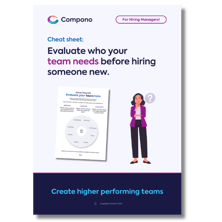Decode Your Culture with Compono's Culture-Candidate Checker™
As your organisation grows, hiring the right people becomes one of the most critical factors for success. Yet, many businesses struggle with the...
Become the expert on delivering
valid and fair assessments for
your training and education.
Hire
|
Engage
|
Develop
|
|
Automatically match to candidates who are a great fit for your team culture and who are intrinsically motivated to succeed. |
Deeply understand your organisation with science-backed analytics on your culture, team design, and engagement. |
Back your onboarding, compliance and skill development with industry-leading credentialling, competency and capability expertise.
|
Hey Compono helps you understand your personality and how to turn it into your superpower.
First 1,000 users get 10 minutes free.
Just $15 a month after that — cancel anytime.
We’re all different. Which is why we all have our own preferences for performing certain types of work.
Sometimes you see this clearly, other times you may not.
Individual preferences are fine when we're on our own. But in the workplace, we typically need to come together in teams.
So the way we approach work can dramatically affect whether the team as a whole can be successful in performing its collective tasks.
As hiring managers and people leaders, if we want to hire people who will help the team be more successful, we must first understand the 8 types of work actions that high-performing teams do well, and determine the priorities of the team we have right now.
In other words, we must first know who we are now, and clarify what our priorities look like, so we can get who we need from our hiring process.
High-performing teams are typically able to perform all 8 work actions.
It does not mean that you need a person who excels at each work type. This approach acknowledges that team members can flex and change their approach to work as needed.
Evaluating |
Coordinating |
“Let’s weigh up our options”
|
“Let’s make a plan”
|
Doing |
Auditing |
“Let’s get it done”
|
“Let’s focus on the details”
|
Helping |
Advising |
“Let’s support each other”
|
“Let’s investigate the problem”
|
Pioneering |
Campaigning |
“Let’s do it differently”
|
“Let’s sell the dream”
|
With a basic understanding of what high-performing teams do (these 8 types of work), your first step is to evaluate your current team. Remember, we all have our own preferences for performing certain types of work.
Can you identify any of these 8 types of work in your current team?
For example:
Some people naturally like checking details and making sure information is correct, but dislike having to sell or promote new ideas to people.
Others might enjoy dreaming up new ways to do things but will dislike organising individuals and coordinating workflows.
What are your team’s strengths? What about their blind spots?
Once you have a grasp on the current composition of your team, turn your attention to the type of candidates that can complement what your team needs.
We have put together a cheat sheet to help you evaluate your team, and identify the type of candidate needed to drive higher team performance.
Our guide will step you through the process of identifying your team’s priorities, strengths, and blind spots in order to determine the type of work new candidates should bring to the team.
Grab the cheat sheet to make hiring easier by clicking below:


As your organisation grows, hiring the right people becomes one of the most critical factors for success. Yet, many businesses struggle with the...

Part 2: Assess your candidates Start with your benchmark Without a clear understanding of who we are, we simply don't have clarity of who we need. ...

Ever wondered why some teams just click and others seem to struggle, even if every individual is talented? The secret often lies in understanding...
